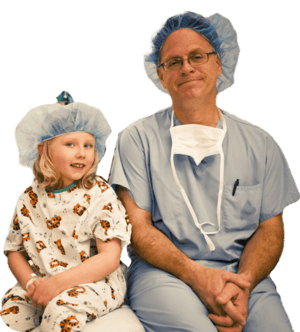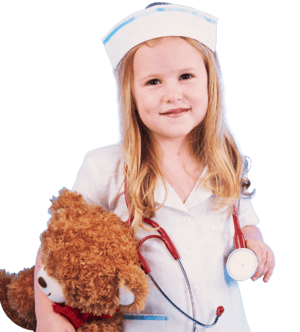Pediatric Resident Educational Experiences
We offer a range of educational experiences to help you learn and prepare for practicing medicine after your residency, as well as achieve successful board certification in pediatrics.
| Monday | Tuesday | Wednesday | Thursday | Friday |
| Pediatric Grand Rounds 12-1 p.m. |
||||
| OR | ||||
|
Afternoon Conference |
Afternoon Conference |
Afternoon Conference |
Afternoon Conference |
Afternoon Conference |
Pediatric Residency Conferences
Our Pediatric Resident Conferences are protected educational conference time for residents. The faculty cover the clinical services during this time.
The curriculum is based on the content specifications created by the American Board of Pediatrics. The curriculum also includes ambulatory pediatric topics and sessions on Quality Improvement and patient safety. Formal board review sessions are also held during pediatric afternoon conferences.
Our program also utilizes a highly interactive case-based group discussion format called McChief or Resident Case Conferences. Each conference is presented by the residents and lasts for 30 minutes. The goal of the McChief conferences is to develop the resident’s critical thinking and presentation skills. This includes the ability to obtain a good patient history, understand important physical findings, and analyze laboratory and radiologic studies in order to generate a pertinent differential diagnosis.
Our Pediatric Resident Conferences are protected educational conference time for residents. The faculty cover the clinical services during this time.
The curriculum is based on the content specifications created by the American Board of Pediatrics. The curriculum also includes ambulatory Pediatric topics and sessions on quality improvement and patient safety. Formal board review sessions are also held during pediatric afternoon conferences.
Our program also utilizes a highly interactive case-based group discussion format called Resident Case Conferences. Each conference is presented by the residents and lasts for 30 minutes. The goal of Resident Case Conferences is to develop the resident’s critical thinking and presentation skills. This includes the ability to obtain a good patient history, understand important physical findings, and analyze laboratory and radiologic studies in order to generate a pertinent differential diagnosis.
Every Friday morning the residents attend Pediatric Grand Rounds where speakers often come from around the country to share their clinical and research expertise with the audience.
Faculty EBM Didactic Sessions
Residents are taught the principles of evidence-based medicine (EBM) concept by the faculty in didactic lectures.
Resident Morbidity and Mortality (M&M) Conferences
Learning how to analytically review cases is an invaluable skill to develop during residency. This process enables one to improve patient safety and quality of care. Our hope is to foster an environment of learning through shared investigation of cases that residents themselves select to discuss during morbidity and mortality conferences. These conferences are to review and discuss medical errors in a safe educational environment as this is a resident run and driven forum.
Other Available Conferences/Educational Opportunities
- Tumor Board (weekly)
- Pediatric Emergency Medicine City-Wide Conference (monthly)
- PICU Lecture Series for Residents
- Palliative Care Conference (monthly)
- Schwartz Rounds
- Annual Wellness Conference
The goal of this rotation is to provide a variety of experiences with our community partners that will introduce the interns to services provided in Summit County that promote the well-being of our children and their families. A few of the experiences provided during this rotation includes participation in Lead Clinic, traveling to a rural clinic devoted to treating the Amish population, visiting a migrant clinic in the summer months, working with our Legal Aid Lawyer, and visiting institutions that help refugees relocate to our community. During this rotation interns will also participate in small group discussions with faculty about diversity, racism and social determinants of health. It is our hope that our residents will develop an understanding of how social determinants of health play a role in the development and health of children and empower the residents to serve as advocates in the community during residency training and after graduating from the program.
Medical Camps
Our residents have the opportunity to spend one week in the summer attending a medical camp in Ohio. Residents can attend Diabetes Camp or other general medical camps (which includes a rheumatology week, heart/pulmonary week, GI week, and a hem/onc week, among other medical conditions). Residents on elective over the summer can choose to attend a camp as part of their elective time, and can go to a camp that aligns with their career interests, or can go just to gain a wonderful experience and volunteer their time in the community. The goals of attending a medical camp is to experience care for patients with chronic disease outside of a hospital setting, see real life management of these conditions, and practice medical decision-making with increased autonomy in a non-traditional environment.
Continuous wellness opportunities are available to residents through Akron Children's wellness program.
Residents are part of the Akron Physician Wellness Initiative which provides free, confidential behavioral wellness services to medical and house staff of Akron Children's and house staff of Summa Health exclusively. This service is free (insurance is not billed) for up to 12 sessions per calendar year.
Services include:
- Private individual counseling for a variety of personal and professional concerns. In-person and telehealth appointments available
- Psychiatric consultation and medication management
- Referral coordination and resource provision
- Wellness promotion and educational sessions for departments and programs
Exercise is a great way to promote both physical and mental well-being. To make it easier for our residents to participate in regular exercise, we provide free memberships to Cleveland Clinic Akron General Health & Wellness Centers in Bath, Green and Stow. These centers are located 15 minutes, south, east, and west, of the hospital.
The residency program has the interns participate in the RISHI Tending the Flame course throughout the year. This is a course in resiliency and work satisfaction for clinicians and graduate program learners.
Pediatric Board Review Course
Graduating residents are given the opportunity to attend an on-site pediatric board review course during their last month of residency. Residents may also use their educational allowance to attend an additional board review course during their residency.
The simulation center and in-situ scenarios have been designed to teach residents how to develop team leadership skills and how to improve communication among healthcare team members during acute pediatric emergencies.
Residents attend “Pediatric Boot Camp” as part of Intern Orientation. The procedures taught at “Boot Camp” are bag valve mask ventilation, intravenous access, intubation, and lumbar puncture. Interns also practice scenarios where they learn how to present patients during family centered rounds, document in the EHR, provide formal hand-offs during transitions in care, and use clinical pathways. Residents also continue to refine their physical examination skills.
Residents are assigned to attend sessions in the simulation center during their Term Newborn and Pediatric Emergency Medicine rotations throughout their residency. During the simulation sessions residents learn and practice procedures. They also practice resuscitation scenarios where they are assigned roles as members of the health care team. At the end of the simulation case, a debriefing session is held where all team members discuss their communication and team skills and how to improve them. All members of the healthcare team reflect and self-assess their own communication and team skills and provide feedback to each other. Residents also are taught how to deliver “bad news” during some of these sessions by our Palliative Care team.
In-situ scenarios are held in the pediatric intensive care unit, emergency department and on the inpatient floors to improve communication among healthcare team members. Residents act as the medical team leader on cases they may encounter in these locations, while working with other healthcare providers as part of the multi-disciplinary team. The use of communication skills, including the “Situation, Background, Assessment and Recommendation” (SBAR model) is promoted. After the in-situ scenario, a faculty member facilitates a debriefing session for all members of the multi-disciplinary team to discuss methods of improving communication and team skills.
An academic advising program is in place to ensure residents transition smoothly into a career in pediatrics. Each resident is paired with an Associate Program Director who provides support and guidance throughout intern year with the goal of transitioning to an advisor in their specialty of choice for their second and third years. The program’s goals include helping residents prepare for the American Board of Pediatrics Certification Examination and either match into the fellowship of their choosing or get a job where they desire after graduation. The advisor helps the resident to set goals for their individualized learning plan and works with the resident to help them develop an individualized master schedule that meets their learning needs and career goals. The academic advisor also reviews the resident’s performance on monthly rotations and serves as the resident’s advocate.
The residency program focuses on promoting our residents’ teaching and leadership skills. Interns learn to and practice teaching skills throughout the academic year. They receive official status of Clinical Instructors at Northeast Ohio Medical University. Residents enhance their teaching and leadership skills at their second-year resident retreat. Residents who are interested in expanding their teaching skills can also take a Teaching elective during their PL 3 year.
By using this site, you consent to our use of cookies. To learn more, read our privacy policy.











